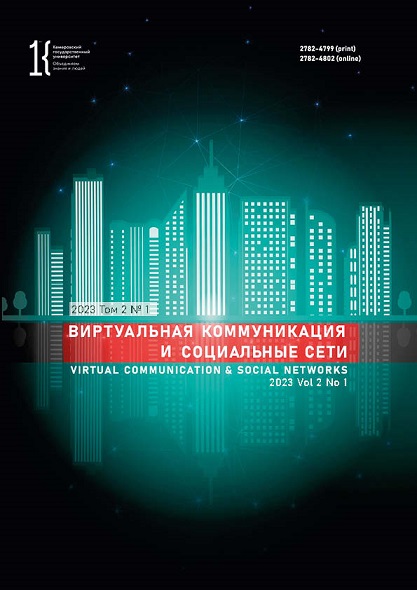Kemerovo, Kemerovo, Russian Federation
Sfax, Tunisia
Online stories posted in domestic and foreign social networks are a special case of storytelling, i.e., a method of transmitting information as a visual or audio-visual personal and subjective narrative that presupposes no mutual correspondence between this subjective knowledge and reality. The article describes theoretical approaches to the study of online narrative as a tool for influencing public consciousness. The authors used such methods as the analysis of secondary sources, empirical observation, and description to study online stories published in Russian and foreign social networks. Interdisciplinary scientific literature made it possible to draw a number of conclusions about the significant influencing potential of this type of storytelling. The genre relies on emotional impact: stories are short, convenient, and clear enough to represent large amounts of information and axiological attitudes. The narrative nature of the phenomenon provides both the fascination of the content consumed and the depth of its cognitive and behavioral influence on the imaginary communities of modern society and their individual representatives.
storytelling, online stories, stories, social consciousness, influence, narrative
1. Ankersmit F. R. Narrative logic. A semantic analysis of the historian's language. Moscow: Ideya-Press, 2003, 360. (In Russ.)] https://www.elibrary.ru/rcimsr
2. Artemova T. V. Narration as a component of the rhetorical strategy (on the basis of A. F. Koni's judicial speeches). Vestnik NovSU, 2007, (43): 55-57. (In Russ.)] https://www.elibrary.ru/munzep
3. Boeva G. N. Storytelling as a new PR-technology. Vestnik Priamurskogo gosudarstvennogo universiteta im. Sholom-Aleykhema, 2020, (2): 26-30. (In Russ.)] https://doi.org/10.24411/2227-1384-2020-10019
4. Brockmeier J., Harre R. Narrative: problems and promises of one alternative paradigm. Voprosy filosofii, 2000, (3): 29-42. (In Russ.)]
5. Kashcheev O. V., Buzkevich A. O. Psychological impact of advertising on the culture of consumer society through social networks (by the example of Instagram). Vestnik slavianskikh kul'tur, 2020, 57: 94-103. (In Russ.)] https://doi.org/10.37816/2073-9567-2020-57-94-103
6. Kirillov A. G. Political narration. Genres and text types in scientific and media discourse, ed. Pastukhov A. G. Orel: OSIAC, 2005, iss. 2, 123-128. (In Russ.)] https://www.elibrary.ru/tsdssx
7. Kuzovenkova A. I. Storytelling as a new media technology. Mediasreda, 2019, (1): 62-67. (In Russ.)] https://doi.org/10.24411/2070-0717-2019-10111
8. Logunova O. S., Zavgorodniaia P. M. Constructing the image of microcelebrity on Instagram: analyzing user experience. Interaction. Interview. Interpretation, 2022, 14(1): 106-122. (In Russ.)] https://doi.org/10.19181/inter.2022.14.1.5
9. Logunova O. S., Lebedev P. A. Digital celebrities: transformation of theoretical approaches. Monitoring of Public Opinion: Economic and Social Changes, 2021, (5): 12-31. (In Russ.)] https://doi.org/10.14515/monitoring.2021.5.1992
10. Minaeva L. V. Corporate storytelling. Vestnik universiteta, 2016, (2): 247-253. (In Russ.)] https://elibrary.ru/wbouzr
11. Popova E. A. Literary communication as the object of the linguistic of narrative's study. Filolologos, 2008, (1-2): 218-228. (In Russ.)] https://www.elibrary.ru/mubhpj
12. Pyatkova O. B. The method of storytelling in training. Shkolnye tekhnologii, 2018, (6): 41-45. (In Russ.)] https://elibrary.ru/zcnkgl
13. Ricoeur P. Time and narrative. Vol. 1. Intrigue and historical narrative. Moscow; St. Petersburg: Universitetskaya kniga, 1998, 313. (In Russ.)]
14. Ricoeur P. Time and narrative. Vol. 2. Configuration in fictional narrative. Moscow; St. Petersburg: Universitetskaya kniga, 2000, 224. (In Russ.)]
15. Simakova S. I., Enbaeva A. P. Storytelling as a reception of journalistic work. Znak: problemnoe pole mediaobrazovanija, 2019, (1): 110-117. (In Russ.)] https://elibrary.ru/xburkr
16. Tiupa V. I. Essay on modern narratology. Critique and Semiotics, 2002, (5): 5-31. (In Russ.)] https://elibrary.ru/tpcled
17. Fadeeva O. A. Storytelling as a symbolic information and communications technology. Political Linguistics, 2015, (4): 150-153. (In Russ.)] https://elibrary.ru/vdgdzl
18. Khoutyz I. P. Storytelling in lecture discourse. Nauchno-tekhnicheskie vedomosti SPbGPU. Gumanitarnye i obshchestvennye nauki, 2019, 10(2): 64-73. (In Russ.)] https://doi.org/10.18721/JHSS.10206
19. Tsvetkova O. L. Storytelling as a tool of brand communication. Verhnevolzhski philological bulletin, 2021, (4): 66-74. (In Russ.)] https://doi.org/10.20323/2499-9679-2021-4-27-66-74
20. Shapinskaya E. N. Storytelling in the narratology of digital era. Kul'turnyj kod, 2022, (1): 53-63. (In Russ.)] https://doi.org/10.36945/2658-3852-2022-1-53-63
21. Schmid W. Narratology. 2nd ed. Moscow: Yazyki slavyankoy kul'tury, 2008, 304. (In Russ.)] https://elibrary.ru/suqjgp
















